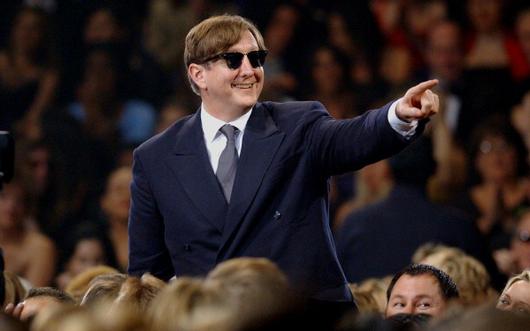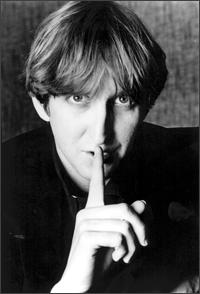
Joseph Henry "T Bone" Burnett retreated to a tent in the Northern California woods to compose songs for "The True False Identity," his first record in 14 years. He spent a month in the timberland and did not bring a guitar. He wrote about 200 pages of couplets and verses, all in longhand.
"I had to disconnect," Burnett explained during a conversation while driving around Los Angeles. "[Tom] Waits says when he's writing, he fills the room up with water. It's a metaphor, but I was looking for a metaphor like that."
Burnett emerged from the woods, and on Tuesday at the Vic Theatre launches his first concert tour in nearly 20 years. His four-piece band includes Waits' guitarist Marc Ribot and Jim Keltner, one of three drummers who played on "The True False Identity."
Released simultaneously with "The True False Identity" (Columbia) is "Twenty Twenty: The Essential T Bone Burnett," (Columbia/DMZ/Legacy), his first 40-song career retrospective.
During Burnett's hiatus from performing and recording, he produced the soundtrack for the film "O Brother, Where Are Thou?" (2000), for which he won a Grammy. He also produced Tony Bennett and k.d. lang's Grammy winning "A Wonderful World," and he served as soundtrack composer/executive producer for "The Big Lebowski" (1998) and last year's "Walk the Line."
Burnett, during our interview, was driving home from a screening of the upcoming Julie Taymor film "Across the Universe," in which the director of "Frida" tells a story of the 1960s with 30 Beatles songs. Burnett supervised the soundtrack.
"I've learned a lot by working on the screen and in the theater," Burnett said. "You're not writing in your own voice. The sound has to be powerful without having so much volume as to overwhelm the spoken word."
In May 1999, Burnett appeared with author-playwright Sam Shepard at the Steppenwolf Theatre, playing music behind Shepard's words and also performing material from Shepard's 1997 play "The Tooth of Crime (Second Dance)." Burnett wrote the first melodies for "The True False Identity" record while working with Shepard in 1997.
"Sam Shepard is an incredible drummer, among other things," Burnett said. "If you take the rhythm out of his plays, there's nothing left. His dialogue is very much like drum solos. When I started working with Sam, I saw that what we were doing was storytelling. When a certain song gets played in one town in the jungle, the next village over knows what's happening. It's about music as a vehicle for communication. I feel like I've been in a master's class over the last 10 years in that area."
Shepard is a student of Native American chants and rhythms, stemming from the Native American belief that gods exist in the ground. In that light, Burnett told his "True False Identity" studio band to imagine they were playing in an auditorium that was a giant maraca. The ensemble's goal was to shake an audience as if they were beads inside the maraca.
The record is driven by the drums and percussion of Carla Azar of the band Autolux, Jay Bellerose (Cassandra Wilson, Joe Henry) and Keltner, who played on John Lennon's "Walls and Bridges." Burnett's incisive lyrics paired with Keltner's elongated rhythms gives "True False Identity" an updated "Walls and Bridges" sound.
"I met Keltner in 1967 or '68 in Hollywood," Burnett said. "I was working with a Texas band called The Fair. They didn't have a drummer, so we called on Keltner. He is an incredibly versatile drummer, and all three of the drummers we used are musicians first and drummers second. They're playing melodies and arrangements. They're not just playing beats. As well as imagining the audience as beads in a maraca, we were getting rid of beats and playing a rumble instead. We let the music arrive, rather than spell it out for everybody."
On the record, Burnett sings in mystical tones, "It's a mortal cinch. No resilience. We didn't build this place to last forever. What A Town. What A Great Town."
More than any point in his career, Burnett has made every word count.
"Really, you want every phrase to be a gag," he said. "You don't need to string them together. If you get the right strength to your language, each gag will hang with the one before it and the one after it."
Burnett accomplishes this in "Palestine, Texas" where he evokes the Rat Pack (Frank, Sam, Dean and even Shecky, as in Greene) into commentary about the confined shadows of contemporary America. He said, "At one time this was the live-and-let-live, mind-your-own-business kind of country. It wasn't the rattled country we've been living in the last 30 years. There was a time we were able to deal with problems in a state-of-the-art way, and those guys represented that to a lot of people. They certainly do for me. Sinatra is still as good as it gets."
Six degrees of Bob Dylan
The connection between T Bone Burnett and Bob Dylan dates back to 1975, when Burnett and playwright Sam Shepard became members of Dylan's Rolling Thunder Revue. Shepard was a drummer with the Holy Modal Rounders, the country-folk rock aggregation founded by Peter Stampfel.
Jakob Dylan, Bob's son and singer for the Wallflowers, will open most of Burnett's shows when Burnett's 15-city tour kicks off Tuesday at the Vic Theatre. On Wednesday, Bob Dylan's 65th birthday, Burnett and Jakob Dylan will appear at the Ryman Auditorium in Nashville.
Dylan's son Jesse directed "vidiosyncrasy," a 20-minute fillm featuring Burnett in a solo performance of songs and spoken word that appears on the DualDisc version of Burnett's "The True False Identity."
Burnett has heard bits and pieces of Dylan's new "Theme Time Radio Hour" show on XM Radio. "Bono dubbed about 10 minutes of it for me," Burnett said. "It sounded fantastic. Apparently there's some mythical town he's invented where all this stuff is happening."
In commemoration of Dylan's milestone birthday, Wenner Books has released Bob Dylan: The Essential Interviews ($23.95), a chronlogical collection of 31 conversations edited by Jonathan Cott. Chestunuts include Studs Terkel's 1963 interview with Dylan on WFMT, Nat Henoff's wide ranging 1966 Playboy interview and an interview Sam Shepard turned into a one-act play for Esquire in 1987.


Nenhum comentário:
Postar um comentário